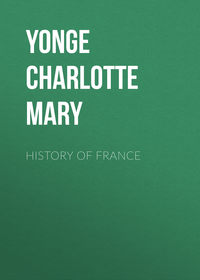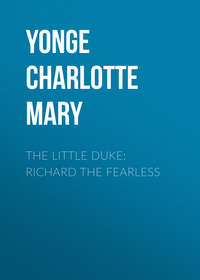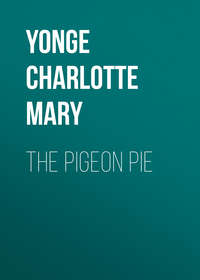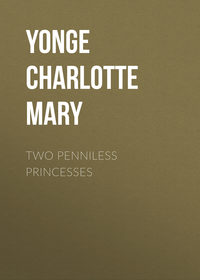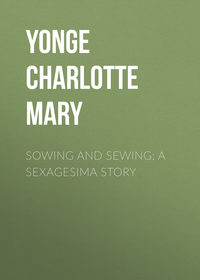
Chantry House
My mother was very still and calm, hardly shedding a tear, but her whole demeanour was as if life were over for her, and she had nothing to do save to wait. She seemed to care very little for tendernesses or attentions on our part. No doubt she would have been more desolate without them, but we always had a baffled feeling, as though our affection were contrasted with her perfect union with her husband. Yet they had been a singularly undemonstrative couple; I never saw a kiss pass between them, except as greeting or farewell before or after a journey; and if my mother could not use the terms papa or your father, she always said, ‘Mr. Winslow.’ There was a large gathering at the funeral, including Mr. Fordyce, but he slept at Hillside, and we scarcely saw him—only for a few kind words and squeezes of the hand. Holy Week was begun, and he had to hurry back to Beachharbour that very night.
The will had been made on my father’s coming into the inheritance. It provided a jointure of £800 per annum for my mother, and gave each of the younger children £3000. A codicil had been added shortly after Griffith’s death, written in my father’s hand, and witnessed by Mr. Henderson and Amos Bell. This put Clarence in the position of heir; secured £500 a year to Griffith’s widow, charged on the estate, and likewise an additional £200 a year to Emily and to me, hers till marriage, mine for life, £300 a year to Martyn, until Earlscombe Rectory should be voided, when it was to be offered to him. The executors had originally been Mr. Castleford and my mother, but by this codicil, Clarence was substituted for the former.
The legacies did not come out of the Chantry House property, for my father had, of course, means of his own besides, and bequests had accrued to both him and my mother; but Clarence was inheriting the estate much more burthened than it had been in 1829, having £2000 a year to raise out of its proceeds.
My mother was quite equal to business, with a sort of outside sense, which she applied to it when needful. Clarence made it at once evident to her that she was still mistress of Chantry House, and that it was still to be our home; and she immediately calculated what each ought to contribute to the housekeeping. She looked rather blank when she found that Clarence did not mean to give up business, nor even to become a sleeping partner; but when she examined into ways and means, she allowed that he was prudent, and that perhaps it was due to Mr. Castleford not to deprive him of an efficient helper under present circumstances. Meantime she was content to do her best for Earlscombe ‘for the present,’ by which she meant till her son brought home a wife; but we knew that to him the words bore a different meaning, though he was still in doubt and uncertainty how to act, and what might be the wrong to be undone.
He was anxious to persuade her to go from home for a short time, and prevailed on her at last to take Emily and me to Dawlish, while the repairs went on which had been deferred during my father’s feebleness; at least that was the excuse. We two, going with great regret, knew that his real reason was to have an opportunity for a search among the ruins.
It was in June, just as Martyn came back from Oxford, eager to share in the quest. Those two brothers would trust no one to help them, but one by one, in the long summer evenings, they moved each of those stones; I believe the servants thought they were crazed, but they could explain with some truth that they wanted to clear up the disputed points as to the architecture, as indeed they succeeded in doing.
They had, however, nearly given up, having reached the original pavement and disinterred the piscina of the side altar, also a beautiful coffin lid with a floriated cross; when, in a kind of hollow, Martyn lit upon the rotten remains of something silken, knotted together. It seemed to have enclosed a bundle. There were some rags that might have been a change of clothing, also a Prayer-book, decayed completely except the leathern covering, inside which was the startling inscription, ‘Margaret Winslow, her booke; Lord, have mercy on a miserable widow woman.’ There was also a thick leathern roll, containing needles, pins, and scissors, entirely corroded, and within these a paper, carefully folded, but almost destroyed by the action of damp and the rust of the steel, so that only thus much was visible. ‘I, Margaret Winslow, being of sound mind, do hereby give and bequeath—’
Then came stains that defaced every line, till the extreme end, where a seal remained; the date 1707 was legible, and there were some scrawls, probably the poor lady’s signature, and perhaps that of witnesses. Clarence and Martyn said very little to one another, but they set out for Dawlish the next day.
‘Found’ was indicated to us, but no more, for they arrived late, and had to sleep at the hotel, after an evening when we were delighted to hear my mother ask so many questions about household and parish affairs. In the morning she was pleased to send all ‘the children’ out on the beach, then free from the railway. It was a beautiful day, with the intensely blue South Devon sea dancing in golden ripples, and breaking on the shore with the sound Clarence loved so well, as, in the shade of the dark crimson cliffs, Emily sat at my feet and my brothers unfolded their strange discoveries into her lap. There was a kind of solemnity in the thing; we scarcely spoke, except that Emily said, ‘Oh, will she come again,’ and, as the tears gathered at sight of the pathetic petition in the old book, ‘Was that granted?’
We reconstructed our theory. The poor lady must have repented of the unjust will forced from her by her stepsons, and contrived to make another; but she must have been kept a captive until, during their absence at some Christmas convivialities, she tried to escape; but hearing sounds betokening their return, she had only time to hide the bundle in the ruin before she was detected, and in the scuffle received a fatal blow.
‘But why,’ I objected, ‘did she not remain hidden till her enemies were safe in the house?’
‘Terrified beyond the use of her senses,’ said Clarence.
‘By all accounts,’ said Martyn, ‘the poor creature must have been rather a silly woman.’
‘For shame, Martyn,’ cried Emily, ‘how can you tell? They might have seen her go in, or she might have feared being missed.’
‘Or if you watch next Christmas you may see it all explained.’
To which Emily replied with a shiver that nothing would induce her to go through it again, and indeed she hoped the spirit would rest since the discovery had been made.
‘And then?’—one of us said, and there was a silence, and another futile attempt to read the will.
‘I shall take it to London and see what an expert can do with it,’ said Clarence. ‘I have heard of wonderful decipherings in the Record Office; but you will remember that even if it can be made out, it will hardly invalidate our possession after a hundred and thirty years.’
‘Clarence!’ cried Emily in a horrified voice; and I asked if the date were not later than that by which we inherited.
‘Three years,’ Clarence said, ‘yes; but as things stand, it is absolutely impossible for me to make restitution at present.’
‘On account of the burthens on the estate?’ I said.
‘Oh, but we could give up,’ said Emily.
‘I dare say!’ said Clarence, smiling; ‘but to say nothing of poor Selina, my mother would hardly see it in the same light, nor should I deal rightly, even if I could make any alterations; I doubt whether my father would have held himself bound—certainly not while no one can read this document.’
‘It would simply outrage his legal mind,’ said Martyn.
‘Then what is to be done? Is the injustice to be perpetual?’ asked Emily.
‘This is what I have thought of,’ said Clarence. ‘We must leave matters as they are till I can realise enough either to pay off all these bequests, or to offer Mr. Fordyce the value of the estate.’
‘It is not the whole,’ I said.
‘Not the Wattlesea part. This means Chantry House and the three farms in the village. £10,000 would cover it.’
‘Is it possible?’ asked Emily.
‘Yes,’ returned Clarence, ‘God helping me. You know our concern is bringing in good returns, and Mr. Castleford will put me in the way of doing more with my available capital.’
‘We will save so as to help you!’ added Emily. At which he smiled.
CHAPTER XLII
ON A SPREE
‘Her eyes as stars of twilight fair,Like twilight too, her dusky hair,But all things else about her drawnFrom May-time and the cheerful dawn,A dancing shape, an image gay,To haunt, to startle, and waylay.’Wordsworth.Clarence went to London according to his determination, and as he had for some time been urgent that I should try some newly-invented mechanical appliances, he took me with him, this being the last expedition of the ancient yellow chariot. One of his objects was that I should see St. Paul’s, Knightsbridge, which was then the most distinguished church of our school of thought, and where there was to be some special preaching. The Castlefords had a seat there, and I was settled there in good time, looking at the few bits of stained glass then in the east window, when, as the clergy came in from the vestry, I beheld a familiar face, and recognised the fine countenance and bearing of our dear old friend Frank Fordyce.
Then, looking at the row of ladies in front of me, I beheld for a moment an outline of a profile recalling many things. No doubt, Anne Fordyce was there, though instead of barely emulating my stunted stature, she towered above her companions, looking to my mind most fresh and graceful in her pretty summer dress; and I knew that Clarence saw her too.
I had never heard Mr. Fordyce preach before, as in his flying visits his ministrations were due at Hillside; and I certainly should have been struck with the force and beauty of his sermon if I had never known him before. It was curious that it was on the 49th Psalm, meant perhaps for the fashionable congregation, but remarkably chiming in with the feelings of us, who were conscious of an inheritance of evil from one who had ‘done well unto himself;’ though, no doubt, that was the last thing honest Parson Frank was thinking of.
When the service was over, and Anne turned, she became aware of us, and her face beamed all over. It was a charming face, with a general likeness to dear Ellen’s, but without the fragile ethereal look, and all health, bloom, and enjoyment recalling her father’s. She was only moving to let her pew-fellows pass out, and was waiting for him to come for her, as he did in a few moments, and he too was all pleasure and cordiality. He told us when we were outside that he had come up to preach, and ‘had brought Miss Anne up for a spree.’ They were at a hotel, Mrs. Fordyce was at home, and the Lesters were not in town this season—a matter of rejoicing to us. Could we not come home and dine with them at once? We were too much afraid of disappointing Gooch to do so, but they made an appointment to meet us at the Royal Academy as soon as it was open the next morning.
There was a fortnight of enjoyment. Parson Frank was like a boy out for a holiday. He had not spent more than a day or two in town for many years; Anne had not been there since early childhood, and they adopted Clarence as their lioniser, going through such a country-cousin course of delights as in that memorable time with Ellen. They even went down to Eton and Windsor, Frank Fordyce being an old Etonian. I doubt whether Clarence ever had a more thoroughly happy time, not even in the north of Devon, for there was no horse on his mind, and he was not suppressed as in those days. Indeed, I believe, it is the experience of others besides ourselves that there is often more unmixed pleasure on casual holidays like this than in those of early youth; for even if spirits are less high (which is not always the case), anticipations are less eager, there is more readiness to accept whatever comes, more matured appreciation, and less fret and friction at contretemps.
I was not much of a drag, for when I could not be with the others, I had old friends, and the museum was as dear to me as ever, in those recesses that had been the paradise of my youth; but there was a good deal in which we could all share, and as usual they were all kind consideration.
Anne overflowed with minute remembrances of her old home, and Clarence so basked in her sunshine that it began to strike me that here might be the solution of all the perplexities especially after the first evening, when he had shown his strange discovery to Mr. Fordyce, who simply laughed and said we need not trouble ourselves about it. Illegible was it? He was heartily glad to hear that it was. Even otherwise, forty years’ possession was quite enough, and then he pointed to the grate, and said that was the best place for such things. There was no fire, but Clarence could hardly rescue the paper from being torn up.
As to the ghost, he knew much less than his daughter Ellen had done. He said his old aunt had some stories about Chantry House being haunted, and had thought it incumbent on her to hate the Winslows, but he had thought it all nonsense, and such stories were much better forgotten. ‘Would he not see if there were any letters?’
There might be, perhaps in the solicitor’s office at Bath, but if he ever got hold of them, he should certainly burn them. What was the use of being Christians, if such quarrels were to be remembered?
Anne knew nothing. Aunt Peggy had died before she could remember, and even Martyn had been discreet. Clarence said no more after that one conversation, and seemed to me engrossed between his necessary business at the office, and the pleasant expeditions with the Fordyces. Only when they were on the point of returning home, did he tell me that the will had been pronounced utterly past deciphering, and that he thought he saw a way of setting all straight. ‘So do I,’ was my rejoinder, and there must have been a foolishly sagacious expression about me that made him colour up, and say, ‘No such thing, Edward. Don’t put that into my head.’
‘Isn’t it there already?’
‘It ought not to be. It would be mere treachery in these sweet, fresh, young, innocent, days of hers, knowing too what her mother would think of it and of me. Didn’t you observe in old Frank’s unguarded way of reading letters aloud, and then trying to suppress bits, that Mrs. Fordyce was not at all happy at our being so much about with them, poor woman. No wonder! the child is too young,’ he added, showing how much, after all, he was thinking of it. ‘It would be taking a base advantage of them now.’
‘But by and by?’
‘If she should be still free when the great end is achieved and the evil repaired, then I might dare.’
He broke off with a look of glad hope, and I could see it was forbearance rather than constitutional diffidence that withheld him from awakening the maiden’s feelings. He was a very fine looking man, in his prime—tall, strong, and well made, with a singularly grave, thoughtful expression, and a rare but most winning smile; and Anne was overflowing with affectionate gladness at intercourse with one who belonged to the golden age of her childhood. I could scarcely believe but that in the friction of the parting the spark would be elicited, and I should even have liked to kindle it for them myself, being tolerably certain that warm-hearted, unguarded Parson Frank would forget all about his lady and blow it with all his might.
We dined with the Fordyces at their hotel, and sat in the twilight with the windows open, and we made Anne and Clarence sing, as both could do without notes, but he would not undertake to remember anything with an atom of sentiment in it, and when Anne did sing, ‘Auld lang syne,’ with all her heart, he went and got into a dark corner, and barely said, ‘Thank you.’
Not a definite answer could be extracted from him in reply to all the warm invitations to Beachharbour that were lavished on us by the father, while the daughter expatiated on its charms; the rocks I might sketch, the waves and the delicious boating, and above all the fisher children and the church. Nothing was wanting but to have us all there! Why had we not brought Mrs. Winslow, and Emily, and Martyn, instead of going to Dawlish?
Good creatures, they little knew the chill that had been cast upon Martyn. They even bemoaned the having seen so little of him. And we knew all the time that they were mice at play in the absence of their excellent and cautious cat.
‘Now mind you do come!’ said Anne, as we were in the act of taking leave. ‘It would be as good as Hillside to have you by my Lion rock. He has a nose just like old Chapman’s, and you must sketch it before it crumbles off. Yes, and I want to show you all the dear old things you made for my baby-house after the fire, your dear little wardrobe and all.’
She was coming out with us, oblivious that a London hotel was not like her own free sea-side house. Her father was out at the carriage door, prepared to help me in, Clarence halted a moment—
‘Please, pray, go back, Anne,’ he said, and his voice trembled. ‘This is not home you know.’
She started back, but paused. ‘You’ll not forget.’
‘Oh no; no fear of my forgetting.’
And when seated beside me, he leant back with a sigh.
‘How could you help?’ I said.
‘How? Why the perfect, innocent, childish, unconsciousness of the thing,’ he said, and became silent except for one murmur on the way.
‘Consequences must be borne—’
CHAPTER XLIII
THE PRICE
‘With thee, my bark, I’ll swiftly go Athwart the foaming brine.’Lord Byron.Clarence would not tell me his purpose, he said, till he had considered it more fully; nor could we have much conversation on the way home, as my mother had arranged that we should bring an old friend of hers back with us to pay her a visit. So I had to sit inside and make myself agreeable to Mrs. Wrightson, while Clarence had plenty of leisure for meditation outside on the box seat. The good lady said much on the desirableness of marriage for Clarence, and the comfort it would be to my mother to see Emily settled.
We had heard much in town of railway shares; and the fortunes of Hudson, the railway king, were under discussion. I suspected Clarence of cogitating the using his capital in this manner; and hoped that when he saw his way, he might not think it dishonourable to come into further contact with Anne, and reveal his hopes. He allowed that he was considering of such investments, but would not say any more.
My mother and Emily had, in the meantime, been escorted home by Martyn. The first thing Clarence did was to bespeak Emily’s company in a turn in the garden. What passed then I never knew nor guessed for years after. He consulted her whether, in case he were absent from England for five, seven, or ten years, she would be equal to the care of my mother and me. Martyn, when ordained, would have duties elsewhere, and could only be reckoned upon in emergencies. My mother, though vigorous and practical, had shown symptoms of gout, and if she were ill, I could hardly have done much for her; and on the other hand, though my health and powers of moving were at their best, and I was capable of the headwork of the estate, I was scarcely fit to be the representative member of the family. Moreover, these good creatures took into consideration that poor mamma and I would have been rather at a loss as each other’s sole companions. I could sort shades for her Berlin work, and even solve problems of intricate knitting, and I could read to her in the evening; but I could not trot after her to her garden, poultry-yard, and cottages; nor could she enter into the pursuits that Emily had shared with me for so many years. Our connecting link, that dear sister, knew how sorely she would be missed, and she told Clarence that she felt fully competent to undertake, conjointly with us, all that would be incumbent on Chantry House, if he really wanted to be absent. For the rest, Clarence believed my mother would be the happier for being left regent over the estate; and his scheme broke upon me that very forenoon, when my mother and he were settling some executor’s business together, and he told her that Mr. Castleford wished him to go out to Hong Kong, which was then newly ceded to the English, and where the firm wished to establish a house of business.
‘You can’t think of it,’ she exclaimed, and the sound fell like a knell on my ears.
‘I think I must,’ was his answer. ‘We shall be cut out if we do not get a footing there, and there is no one who can quite answer the purpose.’
‘Not that young Frith—’
‘Ten to one but he is on his way home. Besides, if not, he has his own work at Canton. We see our way to very considerable advantages, if—’
‘Advantages!’ she interrupted. ‘I hate speculation. I should have thought you might be contented with your station; but that is the worst of merchants,—they never know when to stop. I suppose your ambition is to make this a great overgrown mansion, so that your father would not know it again.’
‘Certainly not that, mamma,’ said Clarence smiling; ‘it is the last thing I should think of; but stopping would in this case mean going backward.’
‘Why can’t Mr. Castleford send one of his own sons?’
‘Probably Walter may come out by and by, but he has not experience enough for this.’
Clarence had not in the least anticipated my mother’s opposition, for he had come to underestimate her affection for and reliance on him. He had us all against him, for not only could we not bear to part with him; but the climate of Hong-Kong was in evil repute, and I had become persuaded that, with his knowledge of business, railway shares and scrip might be made to realise the amount needed, but he said, ‘That is what I call speculation. The other matter is trade in which, with Heaven’s blessing, I can hope to prosper.’
He explained that Mr. Castleford had received him on his coming to London with almost a request that he would undertake this expedition; but with fears whether, in his new position, he could or would do so, although his presence in China would be very important to the firm at this juncture; and there would be opportunities which would probably result in very considerable profits after a few years. If Clarence had been, as before, a mere younger brother, it would have been thought an excellent chance; and he would almost have felt bound by his obligations to Mr. Castleford to undertake the first starting of the enterprise, if it had not been for our recent loss, and the doubt whether he could he spared from home.
He made light of the dangers of climate. He had never suffered in that way in his naval days, and scarcely knew what serious illness meant. Indeed, he had outgrown much of that sensibility of nerve which had made him so curiously open to spiritual or semi-spiritual impressions.
‘Any way,’ he said, ‘the thing is right to be done, provided my mother does not make an absolute point of my giving it up; and whether she does or not depends a good deal on how you others put it to her.’
‘Right on Mr. Castleford’s account?’ I asked.
‘That is one side of it. To refuse would put him in a serious difficulty; but I could perhaps come home sooner if it were not for this other matter. I told him so far as that it was an object with me to raise this sum in a few years, and he showed me how there is every likelihood of my being able to do so out there. So now I feel in your hands. If you all, and Edward chiefly, set to and persuade my mother that this undertaking is a dangerous business, and that I can only be led to it by inordinate love of riches—’
‘No, no—’
‘That’s what she thinks,’ pursued Clarence, ‘and that I want to be a grander man than my father. That’s at the bottom of her mind, I see. Well, if you deplore this, and let her think the place can’t do without me, she will come out in her strength and make it my duty to stay at home.’
‘It is very tempting,’ said Emily.
‘We all undertook to give up something.’
‘We never thought it would come in this way!’
‘We never do,’ said Clarence.
‘Tell me,’ said Martyn, ‘is this to content that ghost, poor thing? For it is very hard to believe in her, except in the mullion room in December.’




